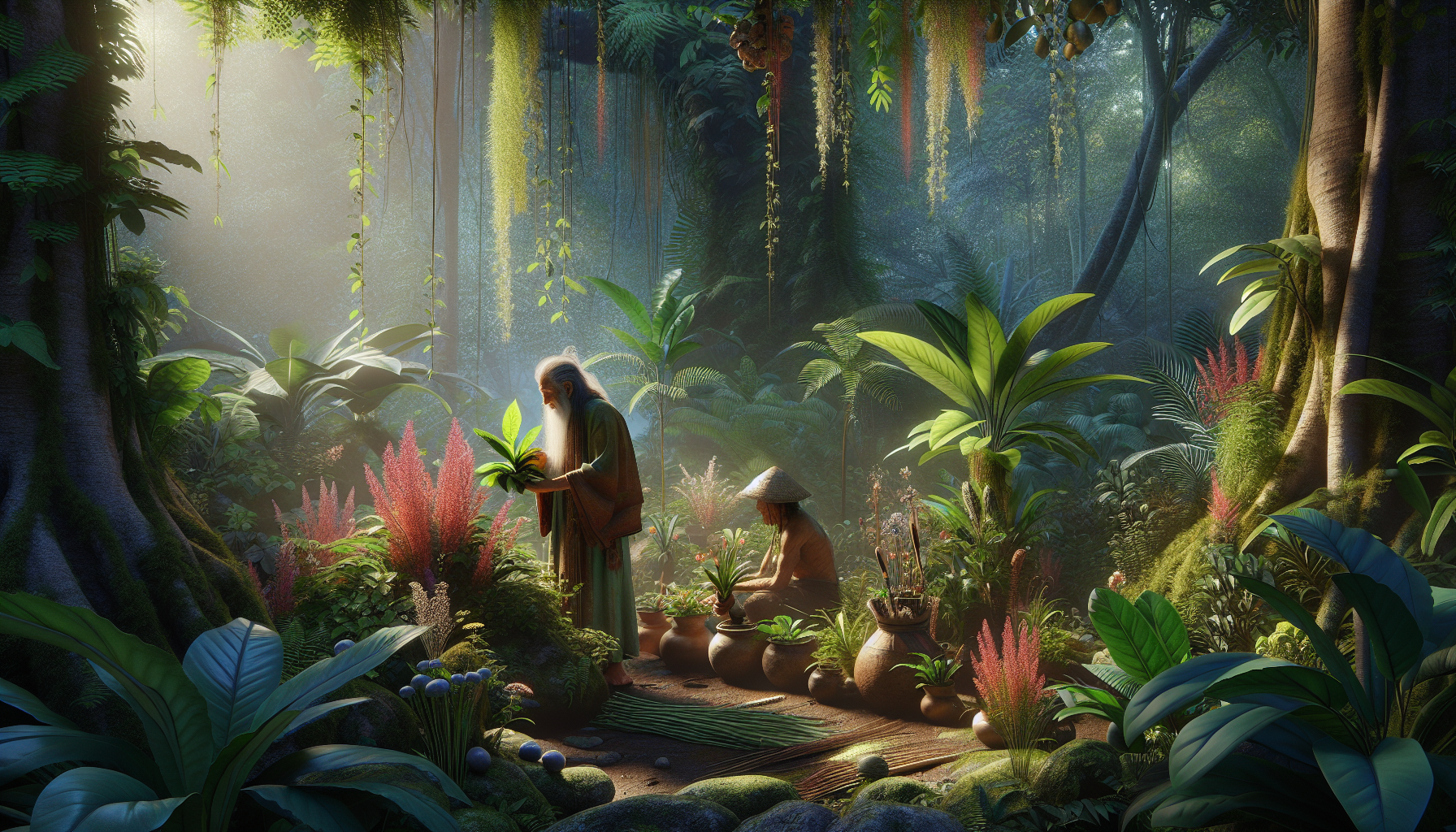In a world increasingly dominated by technology and rapid urbanization, there’s a growing longing to reconnect with the earth and its ancient wisdom. As we navigate the complexities of modern life, many are turning their gaze backward, seeking guidance from the age-old traditions that have nourished human beings for millennia. The timeless teachings of traditional plant wisdom offer a sanctuary of knowledge, inviting us to unlock the secrets of nature’s pharmacy for improved health and harmonious living. 🌿
For countless generations, indigenous cultures around the globe have harnessed the power of plants, not only to heal the body but also to foster a deep sense of spiritual and communal well-being. These practices are not relics of a bygone era but rather vibrant, living traditions that offer profound insights into holistic health and environmental stewardship. By exploring these practices, we can glean invaluable lessons on how to live in harmony with our natural surroundings and our inner selves.
In this exploration of traditional plant teachings, we will delve into the rich tapestry of knowledge passed down through generations. We will uncover the diverse ways in which different cultures utilize plants for medicinal purposes, spiritual growth, and community building. From the verdant rainforests of the Amazon to the arid deserts of Africa, these teachings reveal a universal language of healing that transcends geographical boundaries. Through stories and interviews with contemporary practitioners, we aim to bridge the gap between ancient wisdom and modern science, highlighting the relevance of these practices in today’s world.
As we journey deeper into this topic, we will examine how traditional plant wisdom can complement modern healthcare practices. By integrating the two, we not only enhance our physical well-being but also promote a more sustainable and ethically grounded approach to health. We will discuss case studies and research that demonstrate the efficacy of plant-based remedies in treating various ailments, while also addressing the challenges and controversies surrounding the commodification and appropriation of indigenous knowledge.
Join us as we embark on a transformative journey through the world of traditional plant teachings. By embracing this wisdom, we can enrich our lives, promote global biodiversity, and cultivate a more profound respect for the intricate web of life that sustains us. This article is an invitation to open your heart and mind to the lessons of the past, empowering you to forge a healthier, more harmonious future. 🌍
The Intricate Connection Between Plants and Human Health
Plants have been an integral part of human life for thousands of years. Their role transcends mere sustenance; they hold cultural, spiritual, and medicinal significance. From ancient times, communities around the globe have relied on plants not only for food but also for healing and spiritual practices. The wisdom rooted in traditional plant use offers a vast repository of knowledge that continues to benefit modern society.
For instance, traditional Chinese medicine, Ayurveda, and Indigenous healing practices have long utilized the healing properties of plants. These systems view health in a holistic manner, emphasizing the balance between mind, body, and spirit. 🌿 This approach aligns with contemporary holistic health trends, which prioritize natural and integrative methods over purely pharmaceutical solutions.
Modern science has begun to validate many of these traditional uses, discovering active compounds in plants that have significant health benefits. For example, the willow bark, used for centuries to relieve pain, led to the development of aspirin. Similarly, the foxglove plant is the basis for digitalis, a crucial medication for heart conditions. Such discoveries illustrate the enduring relevance of traditional plant knowledge.
The Science Behind Traditional Plant Use
Understanding the scientific basis of traditional plant use enhances our appreciation for these ancient practices. Plants are complex organisms with a wide array of biochemical compounds that can affect human physiology. These compounds, such as alkaloids, flavonoids, and terpenes, interact with our bodies in diverse ways, offering therapeutic benefits.
Research into these compounds often reveals surprising results. For example, studies on the curcumin in turmeric show it has anti-inflammatory and antioxidant properties, supporting its traditional use in treating a variety of ailments. Such scientific insights help bridge the gap between traditional knowledge and modern medicine.
In addition, the environmental context in which plants are grown can influence their medicinal properties. Soil quality, climate, and ecological interactions can all affect the concentration of active compounds in a plant. This highlights the importance of sustainable practices in the cultivation and harvesting of medicinal plants, ensuring they retain their health-promoting properties.
Integrating Traditional Plant Wisdom Into Modern Life
Incorporating traditional plant wisdom into our daily lives can enhance health and well-being. Many people have begun to explore herbal remedies and natural supplements as alternatives to synthetic drugs. This shift is often driven by a desire for more natural and sustainable approaches to health care.
However, integrating these practices requires careful consideration and knowledge. It’s important to understand the proper usage and potential interactions of herbal supplements with other medications. Consulting with healthcare professionals who are knowledgeable about both conventional and alternative medicine is advisable.
To further explore this topic, watch this insightful video: The Power of Plants in Traditional Medicine – Health Channel.
Practical Applications of Traditional Plant Knowledge
Many practical applications of traditional plant knowledge are accessible to the average person. Whether through herbal teas, essential oils, or dietary supplements, integrating these elements into one’s lifestyle can provide numerous health benefits.
- Herbal Teas: Chamomile for relaxation, peppermint for digestion, and ginger for nausea.
- Essential Oils: Lavender for stress relief, eucalyptus for respiratory health, and tea tree for skin conditions.
- Dietary Supplements: Echinacea for immune support, ginkgo biloba for cognitive enhancement, and turmeric for inflammation.
Case Study: The Role of Plants in Indigenous Healing
Indigenous communities have long understood the healing power of plants. Their traditional knowledge is often passed down through generations, encompassing a deep understanding of the local flora and its uses. These practices are not only about physical healing but also include spiritual and cultural dimensions.
For example, the use of sage in smudging rituals is believed to purify the environment and the spirit. Similarly, the Ayahuasca ceremonies practiced by Indigenous peoples in the Amazon are both a spiritual journey and a form of healing, often involving a complex interplay of community support, spiritual guidance, and the psychoactive properties of the plant.
Comparative Analysis: Traditional and Modern Plant-Based Therapies
The integration of traditional plant-based therapies with modern medicine can offer a comprehensive approach to health. While modern medicine excels in acute care and scientific validation, traditional practices offer insights into preventive care and holistic health.
| Aspect | Traditional Plant-Based Therapies | Modern Plant-Based Therapies |
|---|---|---|
| Focus | Holistic balance of mind, body, and spirit | Specific health conditions and symptom relief |
| Method | Rituals, community involvement, and oral traditions | Clinical trials and scientific research |
| Access | Often community-based and passed down through generations | Widely available through healthcare providers and pharmacies |
| Examples | Ayurveda, traditional Chinese medicine, Indigenous healing practices | Herbal supplements, essential oils, pharmaceutical derivatives |
The interplay between these two approaches can lead to innovative healthcare solutions that respect cultural traditions while leveraging scientific advancements.
Incorporating the profound wisdom of traditional plant teachings into contemporary life offers not only health benefits but also a greater connection to nature and our ancestral roots. This approach fosters a sense of harmony and balance, crucial in our fast-paced, modern world. As we continue to explore and validate the power of plants, we unlock new possibilities for health and wellness, deeply rooted in wisdom. 🌱

Conclusion
Rooted in the profound wisdom of traditional plant teaching, this article has journeyed through the intricate and inspiring ways in which ancient knowledge continues to shape our understanding of health and harmony. We have explored the multifaceted relationship between humans and plants, delving into the rich cultural traditions that have preserved this knowledge for generations. By tracing the historical roots and contemporary applications of plant wisdom, we have unlocked a treasure trove of insights that highlight the transformative power of nature in promoting well-being and balance in our lives.
The exploration began with an overview of the historical context of plant teaching, illustrating how ancient civilizations, from the Indigenous peoples of the Americas to the healers of Asia and Africa, have relied on botanical wisdom to treat ailments and sustain health. These practices, rooted in deep observation and interaction with nature, offer invaluable lessons in sustainability and respect for the environment. Such traditions underscore the importance of biodiversity and the intricate connections between ecosystems and human health, echoing the philosophy that we are inextricably linked to the natural world.
As we ventured further, the article shed light on contemporary scientific research that validates many traditional uses of plants. Modern studies have confirmed the efficacy of numerous herbs and natural remedies, providing a bridge between ancient practices and modern medicine. This confluence of traditional wisdom and scientific inquiry not only enriches our understanding but also expands the potential for innovative approaches to health care that are holistic, sustainable, and accessible.
The narrative also emphasized the cultural significance of traditional plant knowledge, highlighting how it is deeply woven into the identity and spiritual practices of many communities. This connection to cultural heritage fosters a sense of belonging and purpose, offering a pathway to mental and emotional well-being. By honoring these traditions, we acknowledge the wisdom of our ancestors and the value of preserving this knowledge for future generations.
In reflecting on the importance of traditional plant teaching, we recognize the urgent need to protect and revitalize this knowledge. The threats posed by globalization, environmental degradation, and cultural homogenization demand that we act as stewards of this wisdom. Initiatives that support community-led conservation efforts, promote ethical and sustainable harvesting practices, and foster cross-cultural exchanges are crucial in ensuring that this heritage is not only preserved but also thrives in a modern context.
As we conclude this exploration of traditional plant teaching, it is evident that the wisdom embedded in these practices offers a powerful framework for achieving health and harmony in today’s world. By integrating this knowledge into our daily lives, we can cultivate a deeper connection to nature, enhance our well-being, and contribute to a more sustainable and equitable future. This journey invites us all to become active participants in the preservation and application of this wisdom, whether through personal practice, community engagement, or advocacy.
We encourage you, the reader, to reflect on the insights shared in this article and consider how you might incorporate traditional plant teachings into your own life. 🌿 Whether it is by learning more about the plants native to your region, supporting local initiatives that promote biodiversity, or simply taking a moment to appreciate the natural world around you, every action counts. Share your thoughts and experiences in the comments section below—your voice is a vital part of this ongoing dialogue. 📚
Together, let us celebrate and protect the legacy of traditional plant wisdom, ensuring it continues to guide us towards a healthier, more harmonious world. 🌎 For further exploration, consider diving into resources from trusted organizations like the American Botanical Council (https://www.herbalgram.org) or the World Health Organization’s Traditional, Complementary and Integrative Medicine page (https://www.who.int/health-topics/traditional-complementary-and-integrative-medicine). These platforms offer valuable information and research that can deepen your understanding and engagement with this timeless knowledge.
Thank you for joining us on this enlightening journey. We hope it inspires you to plant the seeds of wisdom in your own life and communities, nurturing a future where traditional knowledge and modern innovation coexist and flourish.
Toni Santos is a visual storyteller and educational ethnographer whose work celebrates the fluid knowledge systems of nomadic cultures. Through art and research, Toni brings attention to how learning has thrived outside traditional institutions—rooted in movement, oral tradition, and deep connection to land and community.
Guided by a passion for ancestral wisdom, adaptive pedagogy, and cultural resilience, Toni explores the tools, rituals, and environments that once shaped the minds of travelers, herders, and migrating communities. Whether illustrating storytelling circles beneath open skies, wearable mnemonic devices, or maps woven into textiles, Toni’s work honors learning as a lived, sensory, and communal experience.
With a background in visual anthropology and intercultural design, Toni reconstructs the educational models of mobile societies through images and narratives that restore their dignity and relevance in today’s world.
As the creative mind behind Vizovex, Toni shares a rich tapestry of visual essays, artifact-inspired art, and curated stories that reveal the genius of teaching and learning on the move.
His work is a tribute to:
The wisdom of learning through journey, rhythm, and story
The spatial and environmental intelligence of nomadic cultures
The power of intergenerational knowledge passed outside walls
Whether you’re an educator, researcher, or lifelong learner, Toni invites you to step into a world where education is not confined, but carried—one step, one song, one shared insight at a time.





